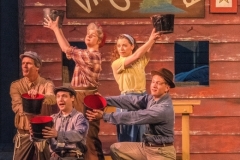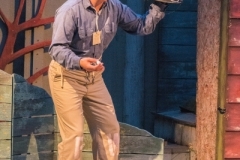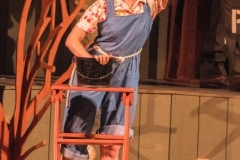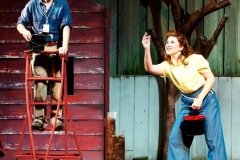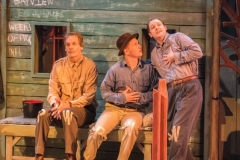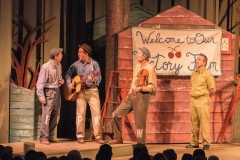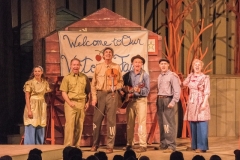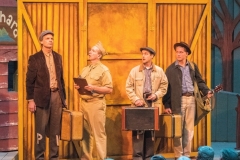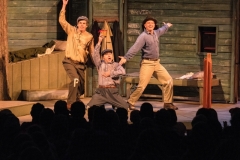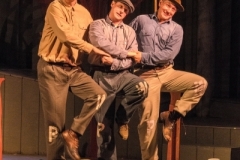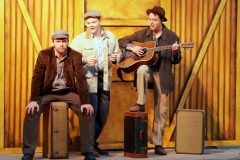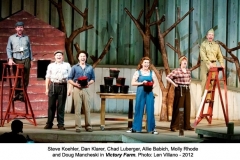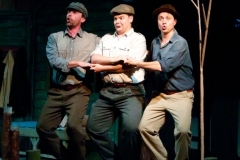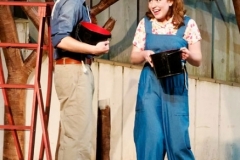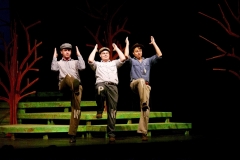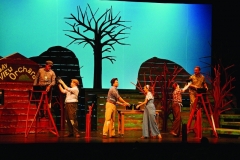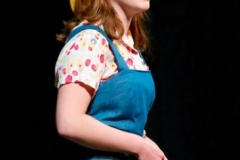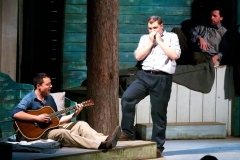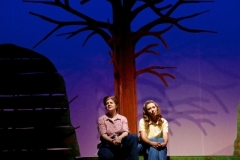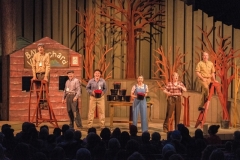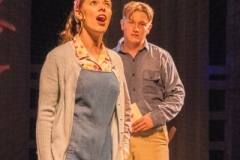Book and Lyrics by Emilie Coulson and Katie Dahl
Music by James Valcq
A tale of family, forgiveness, and the fruits of our labor.
Victory Farm is a story with roots deep in the soil of a Door County cherry orchard. It’s 1944. With a war raging overseas and a labor shortage on the homefront, Edna and her daughter Dottie aren’t sure how their farm will make it through – until help arrives in the most unexpected way. Written with humor and tenderness,Victory Farm is an uplifting tale of family, forgiveness, and the fruits of our labor.
Produced: 2012, 2013, 2017
“Victory Farm is smart and sensitive, tells folks things they might not know, ripples with humor and is laced with Valcq’s knowledge of how to write for the voice, including tricky duets and other layered singing.” – Green Bay Press Gazette, Warren Gerds
“That story is also about discovering how we might learn to sing together while honoring what makes us unique. This being AFT, it’s no surprise that music is important to these characters, giving them – as it gives us – a common language.” – Milwaukee Journal Sentinel, Mike Fischer
“The things about Wisconsin we didn’t learn in school, the American Folklore Theatre tells us with music, humor and poignance.” – OnMilwaukee.com, Damien Jaques
“The amazing through-sung number in ‘Victory Farm’ entitled ‘Hand Over Hand’ runs more than 10 minutes – and among the best ten minutes on stage I’ve experienced during any of the 100-plus productions I’ve seen thus far this year, in theaters ranging from New York to San Francisco.” – Milwaukee Journal Sentinel, Mike Fischer
Inside the Show: "Victory Farm"
An inside look at the process of creating Northern Sky's original musical, "Victory Farm." Interviews with principals, the "Victory Farm" writers, actor Doug Mancheski, plus rehearsal and performance footage.
 EMILIE COULSON (Playwright & Lyricist)
EMILIE COULSON (Playwright & Lyricist)
Emilie, who grew up in Fish Creek, attended shows and met fellow super-fan Katie Dahl at Northern Sky as a child. She volunteered and was a house manager at the theater before Katie, James, and she started working on Victory Farm. Emilie lives in Southern California, and her writing about education and food has appeared in The Atlantic, Lucky Peach, Finesse, and the Poetry Foundation/McSweeney’s publication Open the Door. She runs a cereal company called Daughter’s Granola, and her Door County Blend features Door County Montmorency cherries, of course! Emilie is grateful to her Victory Farm collaborators, and Northern Sky, for the chance to tell this story of finding common ground.
 KATIE DAHL (Playwright & Lyricist)
KATIE DAHL (Playwright & Lyricist)
Katie is a professional singer-songwriter who lives year-round in Baileys Harbor. Her great-great-grandfather was one of the first farmers to grow cherries in Door County. Her association with Northern Sky theater began in 1991 and has included fandom, volunteering, performing, assistant stage management, house management, and board membership. In August, Katie (in collaboration with David Alley, Eric Lewis, and her husband Rich Higdon) will release an album of Fred Alley songs. Katie and Rich are doing their best to cultivate the next generation of Northern Sky fans: their son Guthrie was born in 2016. www.KatieDahlMusic.com
 JAMES VALCQ (Composer)
JAMES VALCQ (Composer)
James is best known as the composer of the Off-Broadway musical The Spitfire Grill (Playwrights Horizons, 2001) which won the Richard Rodgers Production Award administered by the American Academy of Arts and Letters (Stephen Sondheim, chair) and received Best Musical nominations from the Outer Critics Circle and Drama League as well as two Drama Desk nominations. Written with collaborator Fred Alley, Spitfire has been produced over 400 times across the United States, in Germany, South Korea, the UK, Japan, and Australia. Also Off-Broadway, James was the composer/author of Zombies from The Beyond, which opened to critical acclaim in 1995. James has composed scores for Love’s Labour’s Lost at Idaho Shakespeare Festival & Great Lakes Theatre Festival, The Rivals, The Merchant of Venice, and Much Ado About Nothing for Door Shakespeare, Tomas and the Library Lady at Idaho Theatre for Youth, an adaptation of the classic children’s book The Pancake King commissioned by Milwaukee’s Next Act Theatre, and The Passage (another collaboration with Fred Alley) at American Folklore Theatre. Broadway credits as conductor and/or musician include Chicago, Flower Drum Song, Cabaret, Scarlet Pimpernel. Other conducting credits: Maurice Sendak’s production of Really Rosie, Candide, Lady in the Dark, South Pacific (Skylight Opera Theatre), and She Loves Me (Indiana Rep). Directing credits include Zombies from The Beyond off-Broadway and AFT’s The Spitfire Grill. He holds an MFA from New York University Tisch School of the Arts and is a proud member of the American Federation of Musicians & Actors Equity Association. James is the Managing Director of Third Avenue Playhouse in Sturgeon Bay and has appeared in several of TAP’s shows as well as directing.
Josef, German POW, incorrigible optimist and baker by trade...................Chase Stoeger
Wolfgang, German POW, brooding and older.......................................Jeff Herbst*
Karl, German POW, sensitive homesick teenager...................................Isaiah Spetz
Jack, army guard of the POWs...........................................................Doug Mancheski*
Edna, owner of the orchard, widow.......................................................Molly Rhode*
Dottie, Edna's daughter......................................................................Eva Nimmer
*Member of Actors’ Equity Association, the union of Professional Actors and Stage Managers in the United States.
Milwaukee Journal-Sentinel
MIKE FISCHER, Special to the Journal Sentinel - June 27, 2017
Northern Sky Theater evokes WW2 in Door County with musical 'Victory Farm'
FISH CREEK – “Who are the strangers among us? Can we find a way to welcome them? And how can we seek to understand them better?”
These are the questions posed at the end of the 2017 Northern Sky Theater program note that’s penned by the three creators of “Victory Farm”: Emile Coulson and Katie Dahl (book and lyrics) as well as James Valcq (music). Such questions are even more relevant today than they were when I fell in love with this musical, upon seeing its world premiere in Peninsula State Park five summers ago.
The strangers profiled in “Victory Farm” – once again directed and choreographed by Jon Hegge – aren’t bogeymen conjured from harmless Syrian refugees. They’re actual enemy combatants: World War II German POWs, some 370,00 of whom came to America and roughly 2,000 of whom picked cherries in Door County during war-induced labor shortages.
As things get under way, we meet three of them, journeying north through Wisconsin in a boxcar. While they may all speak German, it’s soon apparent that they’re not remotely alike.
The taciturn and gloomy Wolfgang (Jeff Herbst) wants no part of America, treating his time here as the prison sentence it is while simultaneously longing for home.
Josef (Chase Stoeger), a onetime Berlin baker, is Wolfgang’s temperamental opposite: infectiously cheerful, he’s glad to be out of the war and wants to learn all he can of this new country and its language.
Young and shy Karl (Isaiah Spetz) is barely old enough to fight and also barely speaks English; he badly misses his parents and the farm they once worked together.
True to a musical that plays against type, each of these three Germans is more like an American counterpart than either of his fellow countrymen.
Wolfgang’s doppelgänger is Edna (Molly Rhode), no-nonsense owner of the Ellison Bay cherry farm where the men pick. Having just lost her husband on the European front, Edna wants nothing to do with Germans – never mind that she’s part German herself.
Josef is much like Jack (Doug Mancheski), an easygoing American soldier with a funny bone who, at least in theory, is guarding the POWs.
Karl’s counterpart is young and idealistic Dottie (Eva Nimmer). Even before they sing “When I Look at You,” these two are falling for each other, proving anew that love brooks no division.
A stirring populist score – as tightly interwoven with its book as any Northern Sky show I know – could scale any divide.
It celebrates how people come together by working in tandem and asking questions of one another, resulting in the realization of how alike we often are. As one song movingly notes, we stare at the same sky, mark the passage of identical seasons, feel similar love for the land and enjoy the universal language of music.
At the same time, “Victory Farm” is filled with soulful, beautifully wrought reminders that even when we make common cause, our individual sorrows and secret histories threaten to pull us apart, unless we learn to share our hopes and dreams, our sorrows and losses. The real victory cultivated on the farm featured in this show involves learning how we might grow together.
PRODUCTION NOTES
“Sweaty Pies”: As was true when I first saw “Victory Farm” in 2012, one of the audience favorites at the 2017 performance I attended is a song entitled “Sweaty Pies.” That’s Wolfgang’s faulty translation of “sweetie pie,” leading to baker Josef’s proud brag involving the deliciously “sweaty” cherry pie he makes (how he comes up with the necessary sugar, when Edna herself bemoans that she can’t, is a minor inconsistency in the plot).
A display of old-fashioned gemütlichkeit, with dancing among the Germans that comes straight from a Munich Oktoberfest, “Sweaty Pies” further humanizes the play’s three POWs. But it also quietly advances a point made repeatedly in this show: With a bit of sugar and some hard work (the sugar in this pie really is a byproduct of the Germans’ sweat, earning them the necessary coupons to purchase it), we can translate sour into sweet and German into English (and back again), dreaming a new language in which we can feast together.
Bittersweet: For all that, we’re reminded as late as the very last song that both cherries and the world of this show can be bitter as well as sweet. The last song is called “People Come, People Go”; as I heard it sung by Rhode and Nimmer, what came to mind is “Anatevka” from “Fiddler on the Roof.” Coulson and Dahl’s lyrics describe departing trains, never-ending wars, shortening days and falling leaves; while life goes on, it’s also filled with loss.
This is as bittersweet – and honest – an ending as one will see to a Northern Sky show, and “Victory Farm” is better for it. One honors the greatest generation all the more when presentations of its resolute and heroic perseverance take into account all that generation endured and how much it lost. This generation is filled with stories that teach us how to hope and the true meaning of optimism – precisely because its members had the courage to begin again, despite all they’d seen and suffered.
“Hand Over Hand”: From first chord to final flourish, the amazing through-sung number in “Victory Farm” entitled “Hand Over Hand” runs more than 10 minutes – in a musical which, like all Northern Sky shows, runs just 90. But I nevertheless didn’t want “Hand Over Hand” to end, and for good reason: Not only is it a moving anthem celebrating the value and dignity of work, but it’s also a marvelously constructed microcosm of the entire show – and among the best ten minutes on stage I’ve experienced during any of the 100-plus productions I’ve seen thus far this year, in theaters ranging from New York to San Francisco.
Even as the underlying refrain knits the show’s six characters together, we see each of them sing verses giving voice to their private hopes, fears and dreams. During such moments, David Alley’s lighting design spotlights the individual singer delivering the verse in question. Meanwhile, the other characters on stage move in slow motion and in shadow – emblematic of how dimly they’re perceived and understood by the spotlighted soloist (like most of us, each soloist often feels like the only person who’s truly alive). But while those other characters may seem slow and dark, they’re clearly awake and moving, awaiting their own quickening that brings them into the light and allows them to sing and shine. By song’s end, the lights come up on everyone, moving as a collective while they sing and work in real time, harmonizing together.
To steal from Matt Zembrowski’s wonderful, structurally and thematically similar through-sung ensemble number for “Doctor! Doctor!” – entitled “Something in the Air” – one listens to Hand Over Hand” with a hand on heart and “a stirring in my soul that I cannot control.” In both songs, isolated and lonely characters sing what these two shows themselves continually make clear: Even those things that seem to divide us often underscore how much we have in common. Even when we seem to experience and endure the world alone, we often do so together, singing variations on the themes we share.
“Victory Farm” merits inclusion in any Door County vacation plans this summer. I’ll wager the finest slice of Door county cherry pie on my assurance that you’ll enjoy it.
“Victory Farm” continues through Aug. 26 at Northern Sky Theater in Peninsula State Park. For tickets, call 920-854-6117 or visit www.northernskytheater.com.
OnMilwaukee.com
DAMIEN JAQUES - July 9, 2012
Cherry picking with German POWs in Door County
FISH CREEK – The things about Wisconsin we didn't learn in school, the American Folklore Theatre tells us with music, humor and poignance.
For instance, the state hosted about 20,000 foreign prisoners of war during WWII, and most were German. Supervised POW projects ranged from Bayfield to Sturtevant, and some captured enemy combatants were even housed at State Fair Park.
The prisoners provided farm labor in a region whose workforce was depleted by the war effort. That is the context for "Victory Farm," this season's new American Folklore Theatre musical being staged outdoors in Peninsula State Park.
Three German POWs are assigned to a Door County cherry orchard in danger of having its crop spoil on the trees. The owner's husband has died in the war, and she initially resists accepting help from the enemy.
But the Germans, each quite different, are decent fellows with no malice in their hearts, and she grudgingly allows them to assist with the harvest. Homesickness and a love affair between a local and a prisoner predictably follows.
"Victory Farm" is totally reliant on its characters to engage us, with the POW's given the most texture and depth. The show's actor-singers must deliver, and AFT's cast rises to the task.
Dan Klarer charms and sparkles as a German baker brimming with optimism despite his prisoner status. Klarer exudes a gentle warmth that is irresistible.
Chad Luberger is equally effective as a sensitive teenage POW susceptible to puppy love. Veteran Milwaukee actor Steve Koehler draws the most complex character, a brooding older German soldier. We are initially wary of him, but Koehler's success at giving us a look inside the man leads to our understanding him.
Among the other actors, Allie Babich is the classic ingenue, singing like a lark and playing her role with seemingly effortless grace.
James Valcq's savvy score serves the story with its mix of poignant, romantic and rousing numbers, and it fits the AFT tradition of favoring blended harmonies. Emilie Coulson and Katie Dahl, who began attending AFT performances as kids, wrote the book and lyrics.
Jon Hegge directed and choreographed the single-act show.
"Victory Farm" is being staged in rotating repertory with "Belgians in Heaven" and "Cheeseheads, the Musical" this summer.
Milwaukee Journal-Sentinel
MIKE FISCHER, Special to the Journal Sentinel - July 2, 2012
‘Victory Farm’ a Stirring New Musical
FISH CREEK — More than 350,000 German POWs came to the United States during World War II, including some 2,000 that wound up working in Door County, where they saved the cherry harvest on numerous labor-starved family farms. That’s the backdrop for “Victory Farm,” the wonderful new musical in which writers Emilie Coulson and Katie Dahl (book and lyrics) have collaborated with composer James Valcq (“The Spitfire Grill”). Directed and choreographed by Jon Hegge, it headlines American Folklore Theatre’s 2012 summer season.
As “Farm” begins, three German POWs are riding the rails toward their next assignment. Coulson and Dahl take their time introducing them, a smart move that challenges the audience to begin the same emotional journey that still awaits this play’s Wisconsin natives: Seeing the Germans as ordinary people rather than fearing them as a faceless and monolithic enemy.
Ten minutes into the show, it’s already clear that for all they may have in common, these three Germans are also very different from one another.
Wolfgang is stolid, gloomy and industrious - although Steve Koehler gives us glimpse of the swift currents running beneath the seemingly implacable surface, particularly when his rich baritone conveys his deep love for his homeland.
Dan Klarer doesn’t have Koehler’s vocal chops, but he gives a winning performance as Josef, a pudgy Berlin baker and incorrigible optimist who radiates good cheer as Wolfgang’s comic foil. Chad Luberger keeps pace as Karl, a shy and sensitive teen struggling with English - until he begins taking informal lessons from the equally young and impressionable Dottie, who has grown up on the farm to which the three men are assigned.
With her sweet soprano voice and fresh-scrubbed appearance, Allie Babich looks and sounds like the ingénue that Dottie is, and Babich has the good sense to recognize she therefore doesn’t need to overdo the wide-eyed innocence that she naturally embodies.
Having recently lost her husband to the war, Edna has little use for the Germans sent to help her harvest - and even less for the budding romance between Dottie and Karl. Fearful of change and unhappy that her daughter is growing up, she is the American version of Wolfgang, who is equally stern with Karl.
As the POWs’ guard, the reliably comic Doug Mancheski is the American version of Josef: Good-natured, easy-going and inclined to see the humor in life - even during wartime.
There is plenty of humor in this show, much of which plays with variations on the theme of what gets lost in translation; in the performance I attended, the audience particularly loved “Sweaty Pies,” which showcased the vaudevillian side of Hegge’s consistently first-rate and wide-ranging choreography.
But what really makes “Victory Farm” sing is its stirring and emotionally satisfying score, which features moving love songs, a poignant tribute to the meaning of home and through-sung numbers like “Hand Over Hand,” in which Valcq’s harmonies mesh seamlessly with the advancing story.
That story is also about discovering how we might learn to sing together while honoring what makes us unique. This being AFT, it’s no surprise that music is important to these characters, giving them - as it gives us - a common language.
Green Bay Press-Gazette
WARREN GERDS - June 15, 2012
American Folklore Theatre has winner in ‘Victory Farm’
FISH CREEK — German prisoners of war were put to work across the United States during World War II because of the American labor shortage. Some of those POWs wound up in Door County, and three, as of its world premiere Thursday night, ended up in fictional form in a musical of the popular American Folklore Theatre.
"Victory Farm" is immediately captivating.
Karl, Josef and Wolfgang are aboard a train leaving Iowa. For his diary, Josef counts the cornfields as they pass. He gets stuck after 99. He doesn't know English for the next number, so he writes 90-10.
The guys are nonthreatening and likable. You're pulled into what lies ahead for them in Door County. Under the eye of a kindly guard, they harvest cherries for a woman whose husband was killed in the war. The widow and her college-minded daughter are barely making do.
The cast, directed by Jon Hegge, charms and moves — the prisoners are played by Dan Klarer (Josef), Steve Koehler (Wolfgang) and Chad Luberger (Karl), with Molly Rhode as the widow, Edna; Allie Babich as her daughter, Dottie; and Doug Mancheski as the guard, Jack.
Babich has a ringing voice, starting with her song of wonder, "Will I Fly."
"Sweaty Pies" is a rollicking hoot as the prisoners kick up an amazing dance about something that sounds awful. Eventually, they learn the correct word to replace "sweaty."
Some moments grab the heart. "What is the Color" connects all humans and is a beautiful piece by the performers and the authors.
What transpires wonderfully on stage has a wonderful story behind it.
The show is by Emilie Coulson and Katie Dahl (book and lyrics) and James Valcq (music and orchestrations). Coulson and Dahl grew up coming to American Folklore Theatre shows as girls. Now they've written a show for it. Valcq collaborated on the award-winning "The Spitfire Grill" with AFT co-founder Fred Alley. Fred "Doc" Heide, another founder, plays in the orchestra of "Victory Farm."
This familiarity breeds the opposite of contempt. "Victory Farm" is smart and sensitive, tells folks things they might not know, ripples with humor and is laced with Valcq's knowledge of how to write for the voice, including tricky duets and other layered singing.
Don't let that "folklore" fool you: The material is sophisticated without putting on airs.
The remarkable theater with large pine trees in and around its stage is no secret. This year, AFT received the inaugural Wisconsin Department of Tourism award for arts, culture and heritage.
Along with "Victory Farm," AFT's summer includes return productions of "Belgians in Heaven" and "Cheeseheads the Musical." You can't go wrong seeing any one of them.


